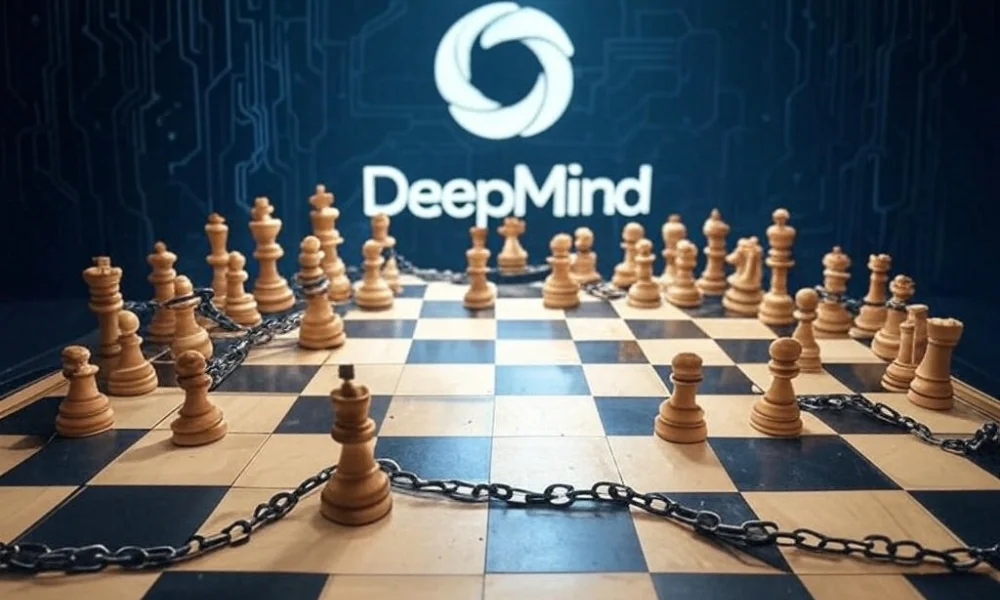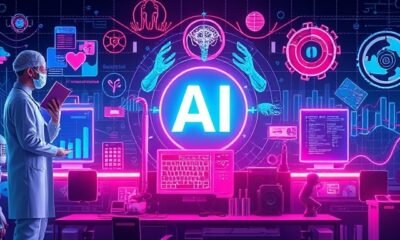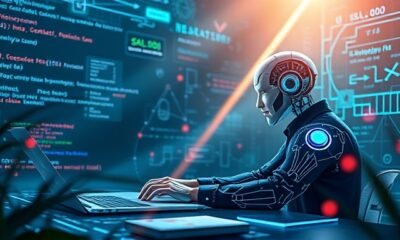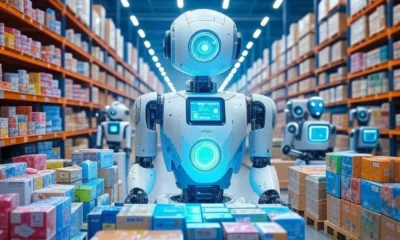Artificial Intelligence
DeepMind’s Noncompete Rules Stir Debate: Innovation vs. Talent Mobility in AI
Google DeepMind’s noncompete rules are fueling a heated debate in 2025, pitting the need to protect AI innovation against the push for talent mobility. This clash could reshape how the artificial intelligence industry balances competition and intellectual property in the years ahead.

In 2025, the Artificial Intelligence industry employs over 300,000 professionals in the U.S. alone, yet a single policy from Google DeepMind could reshape how this talent moves or doesn’t. As artificial intelligence continues to transform industries, the competition for top-tier researchers and innovators is fiercer than ever. DeepMind, a leader in AI research, known for monumental achievements like AlphaGo and advancements in language models, is at the center of a growing debate.
This debate centers on DeepMind’s noncompete agreements, raising questions about the balance between protecting groundbreaking innovations and fostering a dynamic, competitive workforce. Should AI companies restrict their researchers’ mobility to safeguard intellectual property, or should they allow for greater talent movement to fuel further innovation? In this post, I’ll dive into DeepMind’s noncompete policies, explore the arguments for and against them, and discuss how they might affect the future of the AI industry.
Definition
Before diving into the specifics of DeepMind’s noncompete rules, it’s important to define what noncompete agreements are. These are contracts that prevent employees from joining competitors or starting similar businesses for a set period after leaving their current company. Typically used to protect proprietary information and trade secrets, non-competes have been a point of contention in industries where innovation and talent mobility are key to growth.
What Are DeepMind’s Noncompete Rules?
Noncompete agreements are designed to prevent employees from taking their expertise to rival companies within a specific timeframe after leaving. In tech, this usually means a ban on working for direct competitors or starting a similar business within a defined geographical area. While they aim to protect a company’s intellectual property, the rules around them can often be restrictive and raise concerns about talent freedom.
DeepMind’s Policy: What We Know So Far
While the exact terms of DeepMind’s noncompete agreements remain speculative as of April 2025, it is rumored that their policies could prevent former employees from joining competitors like Anthropic or xAI for a certain number of years. Given the rapid advancements in AI, such restrictions could have significant implications for both researchers and the companies vying for their talent. These noncompetes are likely intended to protect DeepMind’s significant investment in AI research and development, but their impact on talent mobility and innovation is still up for debate.
Context in Tech: A Long-Standing Debate
Historically, noncompete agreements have been used in various industries to protect intellectual property, but they have been notably rare in fast-moving fields like AI. In Silicon Valley, for instance, the use of noncompetes has often been criticized, with some high-profile cases, like the 2010s wage-fixing scandal, showing the negative effects of restricting worker mobility. As AI grows exponentially, many argue that such agreements could stifle innovation and slow the progress of the industry as a whole.
Why It Matters Now: The Race for Talent in 2025
As AI continues to evolve, the demand for top-tier talent has only increased. In 2025, companies are fiercely competing to secure the best researchers, developers, and engineers to maintain their competitive edge. DeepMind’s noncompete rules are significant because they could further complicate this talent war, restricting the movement of experts within the field. With companies racing to push the boundaries of AI, any barriers to talent mobility could have far-reaching consequences for innovation and industry growth.
Case For Noncompete Rules: Protecting Innovation
From DeepMind’s point of view, noncompete agreements are vital for protecting the company’s extensive investments in research and innovation. Developing cutting-edge algorithms and neural network architectures takes years of rigorous work and substantial resources. For instance, DeepMind’s AlphaGo and other breakthroughs didn’t emerge overnight. These advancements required teams of highly skilled researchers working in a highly competitive, time-sensitive environment. Noncompetes ensure that researchers cannot immediately apply this proprietary knowledge at rival companies, preventing the leakage of trade secrets that could compromise DeepMind’s competitive advantage.
Without noncompete clauses, a former employee could easily jump ship to a rival firm, potentially applying their insider knowledge to develop similar products that could rival DeepMind’s innovations. In a rapidly evolving field like AI, where every breakthrough has a direct impact on a company’s market position, it’s understandable that DeepMind would want to safeguard the long-term value of its intellectual property by limiting talent movement to competitors.
Intellectual Property: The High Stakes of AI
When it comes to AI, intellectual property (IP) is everything. The stakes are incredibly high because a single breakthrough can radically shift the industry. Take Google’s dominance in the search engine market, for example. It’s partly attributed to their early and heavy investments in AI, which powered their algorithms and continually enhanced the user experience. If a former DeepMind employee were to join a competitor, armed with knowledge about proprietary AI techniques, the potential for undermining years of investment could be significant.
AI is no longer just about improving software; it’s about creating entirely new ways of processing information, understanding language, and making decisions. This new generation of technology holds the potential to disrupt every industry. Protecting AI innovations ensures that companies can continue their research with the confidence that their breakthroughs won’t be replicated by a rival with inside knowledge of their proprietary processes. Therefore, noncompete agreements in AI help ensure that the companies investing heavily in research and development can maintain their leadership in the market.
Investment Justification: Securing Return on R&D Investments
Google, like many other tech giants, invests billions of dollars annually in AI research and development (R&D). This level of investment is necessary to remain at the cutting edge of the field, where the next big innovation could make or break a company’s position. For example, the financial resources spent on developing advanced machine learning models and neural networks can take years to yield a return. Noncompetes help ensure that companies can recoup their investment by keeping valuable talent from moving to competitors who might benefit from the knowledge and skills developed during those years of research.
By enforcing noncompete clauses, DeepMind ensures that the value of its R&D budget is preserved. If employees were free to leave and immediately join or start competing firms, the potential for companies to lose their market edge would rise significantly. Noncompetes, therefore, help ensure that AI companies get the most out of their investments, reducing the risk of talent misappropriation that could potentially undermine their competitive advantage.
Industry Precedent: Noncompetes in Other Sectors
Noncompete agreements are not unique to the tech industry, nor are they a new concept. In fact, they are widely used in industries such as pharmaceuticals, where companies invest billions in developing new drugs and therapies. Just like in AI, the pharmaceutical industry relies heavily on intellectual property to maintain its market dominance. Noncompete clauses help protect these innovations from being quickly replicated by rivals after an employee leaves a company.
In the same way, AI companies like DeepMind view noncompetes as essential for safeguarding their intellectual property. The precedent set by industries like pharmaceuticals demonstrates that these agreements are not just a business strategy but a necessary tool for maintaining competitive integrity. As AI research becomes increasingly complex and valuable, it’s likely that noncompetes will continue to be a standard practice, helping companies protect their research, investments, and long-term market position.
Case Against Noncompete Rules: Stifling Talent Mobility
Critics argue that noncompete agreements hinder talent mobility by locking employees into a single company, ultimately limiting their career opportunities and personal growth. AI research thrives on the free flow of ideas and collaboration across different teams and organizations. By restricting movement, noncompetes potentially discourage top talent from joining companies like DeepMind in the first place. In a highly competitive and dynamic field like AI, individuals want the freedom to explore opportunities and apply their knowledge across multiple platforms. When a company like DeepMind enforces a noncompete clause, it may seem less attractive to researchers looking for career flexibility and the chance to evolve in different environments.
These agreements could particularly dissuade highly skilled professionals who are motivated by the ability to influence the broader AI landscape. Researchers could feel stifled, knowing that once they commit to a company, they might be restricted from using their expertise at a competitor, which limits their ability to contribute to AI’s broader development.
Impact on Workers: Deterring Career Growth
Noncompetes can have a disproportionate impact on early-career professionals and emerging AI researchers. For someone just starting out in AI, the thought of being bound by a noncompete agreement for several years can be a significant deterrent. These researchers are often eager to explore a range of career opportunities, learning from various organizations, and expanding their professional network. The constraints placed by noncompetes could make it difficult for them to pivot to new roles or projects that align with their long-term goals.
Additionally, workers could fear career stagnation if they are unable to join another company or start their own ventures. In a rapidly evolving field like AI, the ability to move freely between organizations is essential to keep up with the latest technologies and stay relevant in the industry. By limiting movement, noncompetes could have a chilling effect on a researcher’s growth, potentially leading to dissatisfaction or even burnout if they feel their potential is capped.
Innovation Paradox: Slowing Industry-Wide Progress
One of the strongest arguments against noncompete agreements in AI is that they could slow industry-wide progress. AI is built on innovation, and innovation thrives when ideas circulate between companies, individuals, and industries. The freedom to move between organizations allows researchers to bring fresh perspectives and knowledge, which can lead to new solutions and breakthroughs.
When researchers are restricted by noncompetes, they are unable to contribute to a broader range of projects or collaborate with different groups in the AI ecosystem. In some cases, former employees who leave a company with fresh ideas and a new outlook on AI have gone on to found successful startups. These startups often spark the next wave of innovation, creating new solutions that push the entire field forward. If talent is locked into one organization for extended periods, the rapid pace of AI innovation could be stunted, leaving potential breakthroughs on the table. As AI continues to evolve, the free exchange of ideas will be crucial for the development of more advanced, ethical, and effective systems.
Legal and Ethical Concerns: Growing Backlash Against Restrictive Practices
Noncompete agreements have come under increasing scrutiny in recent years, particularly in states like California, where such contracts are generally unenforceable. In 2025, more and more states are questioning the ethical implications of noncompetes, especially in industries like AI, where talent is a crucial driving force behind innovation. California, known for its tech and innovation-driven economy, has long had a ban on noncompetes. This has contributed to a thriving startup culture and increased mobility for tech professionals, which has been instrumental in the rapid advancements of the industry.
The growing public backlash against noncompete agreements is also evident in the broader discussion about labor rights in 2025. Workers are increasingly demanding more freedom and flexibility, as the gig economy and remote work models have shown that employees can thrive without being tied to one company for extended periods. The restrictive nature of noncompetes contradicts these shifts in the job market, sparking debates about whether companies should have more control over their employees’ future career choices. As AI becomes an even more integral part of global economies, it’s essential to consider the ethical and legal implications of limiting workers’ ability to move freely within the industry.
The continued push against noncompetes suggests that in the near future, the landscape for talent mobility in AI may become more fluid, enabling workers to contribute to multiple organizations and foster innovation across the sector.
Broader AI Industry Impact
DeepMind’s noncompete policy could potentially set a precedent that pressures its rivals—such as OpenAI, Anthropic, and others—to adopt similar practices. As companies in the AI sector continue to battle for top talent, DeepMind’s approach could encourage competitors to protect their intellectual property by imposing stricter rules on employee mobility. This could lead to a broader trend where noncompetes become a standard practice across the industry, particularly as organizations look to safeguard their proprietary research, algorithms, and breakthroughs.
On the flip side, this approach could provoke a significant backlash, with many in the industry pushing for more open mobility. AI professionals value their freedom to move between companies and contribute to a variety of projects. If more companies adopt restrictive noncompete policies, it could lead to a division between organizations that embrace innovation through talent mobility and those that prioritize protecting their research at all costs. This divide could create a more fragmented competitive landscape, where innovation may stagnate in firms that impose noncompetes, while others—who allow freer movement of talent—might foster a more dynamic, cutting-edge environment. As the debate over noncompetes unfolds, we may see a shift in how AI companies approach hiring and talent retention, influencing not just the future of DeepMind but the entire sector.
Talent Wars: A Growing Shortage of AI Expertise
The ongoing shortage of skilled AI professionals makes talent an even more precious commodity in 2025. As AI adoption accelerates across industries, the demand for top-tier researchers, engineers, and developers continues to outpace supply. In this talent war, noncompete agreements could exacerbate the issue by reducing the pool of available workers. AI experts are already in high demand, and restrictive agreements can limit their movement to companies that are willing to hire them. As a result, highly skilled professionals may seek opportunities in regions or countries that do not enforce noncompete clauses, potentially driving talent away from the United States to places like Europe or Asia, where the labor market is more open.
For example, European countries are known for their relatively relaxed stance on noncompete agreements, making them more attractive for AI professionals who are looking for job flexibility. In Asia, countries like Singapore and China have also seen significant investments in AI research and development, providing ample opportunities for skilled workers. As a result, DeepMind’s policy could unintentionally fuel the exodus of top talent to more flexible regions, further intensifying the global competition for AI expertise.
Startups vs. Giants: The David-and-Goliath Dynamic
One of the most significant consequences of widespread noncompete policies in the AI industry is the potential impact on smaller AI firms. Startups, which rely heavily on fresh talent and innovation, could find themselves at a severe disadvantage if large companies like Google DeepMind start to impose restrictive noncompete agreements. These smaller firms often need access to experienced professionals who have worked at leading tech companies and possess the knowledge and expertise to drive cutting-edge AI projects forward. Noncompetes could create barriers that prevent these startups from attracting the very talent they need to compete with the giants of the tech world.
This dynamic could exacerbate the already widening gap between small AI startups and large tech corporations. While established companies like Google have the financial resources to enforce noncompetes and retain top talent, smaller firms may struggle to secure the skilled workforce necessary to scale their operations. This disparity could stifle innovation in the AI sector, as smaller companies that offer novel ideas might lack the talent to bring them to fruition. The battle between startups and giants could become a case of David vs. Goliath, with the smaller players at a disadvantage if the trend toward noncompetes continues.
Regulatory Radar: Scrutiny from U.S. Regulators
The rise of noncompete agreements in the AI industry is likely to attract scrutiny from U.S. regulators, particularly in light of recent actions against restrictive employment practices. In 2023, the Federal Trade Commission (FTC) took steps to curb the use of noncompetes, recognizing the negative impact they have on workers’ mobility and market competition. If DeepMind’s noncompete policies gain traction, regulators could intensify their efforts to scrutinize such practices, especially in industries like AI where competition for talent is fierce.
By late 2025, we may see even more pressure from the U.S. government to limit or outright ban noncompetes in certain sectors, including AI. The debate could shift from company policies to a broader regulatory discussion about the fairness and ethical implications of noncompete clauses. As AI continues to reshape industries and economies, the role of government oversight in balancing worker rights and business interests will become even more important. If the trend toward noncompete agreements in AI grows, we could witness a regulatory crackdown that forces companies like DeepMind to reconsider their stance.
In the end, the future of talent mobility in AI may not only be shaped by the policies of individual companies but by the broader legal and regulatory environment, which is evolving to protect both innovation and workers’ rights.
Voices in the Debate
The debate over DeepMind’s noncompete rules has sparked strong opinions from AI leaders, both defending and opposing the policy. A DeepMind executive might argue that noncompetes are essential to protecting proprietary research and ensuring the company can continue to lead in AI innovation. “Noncompete agreements are critical to safeguarding the investments we make in AI research,” a hypothetical DeepMind leader might say. “Our team works tirelessly on breakthrough technologies, and these protections ensure we can recoup those investments by preventing critical knowledge from walking out the door.” In this view, noncompetes are not just a legal tool but a necessary measure to maintain DeepMind’s edge in the competitive AI market.
On the other hand, a startup founder might offer a more critical perspective. “Noncompetes limit talent mobility and hurt innovation,” they might argue. “The free flow of ideas and expertise is essential in the AI space, and these policies hinder that. It’s a challenge for smaller companies to compete when they can’t access the full pool of talent.” From this viewpoint, the implementation of noncompetes at major players like DeepMind could create a toxic environment that stifles creativity and slows industry-wide progress.
Employees: Concerns from Those Most Affected
For many AI researchers, noncompete clauses can significantly impact their career freedom. One affected employee might express concern by saying, “I’d think twice about joining a company if I can’t leave freely. Career flexibility is one of the key reasons many of us pursue AI research in the first place. Noncompetes make it harder to innovate without feeling restricted by corporate interests.”
Another researcher might share a more personal take: “I’ve spent years working on cutting-edge AI technology, but knowing I can’t freely move to a new project or company feels like a career sentence. If I were at DeepMind, I’d feel like I’d be trapped—stuck without the option to explore new opportunities or develop my skills further.”
These perspectives highlight the growing discontent among professionals who value mobility and autonomy in their work. While DeepMind and other major companies may see these agreements as protection for intellectual property, many employees are concerned that such policies will ultimately stunt their professional growth and limit their future opportunities.
Public Sentiment: Divided Opinions on Social Media
Public sentiment surrounding DeepMind’s noncompete rules has been loud and divisive, with many voicing concerns over the corporate implications of such policies. On social media platforms like X (formerly Twitter), users have shared mixed opinions, reflecting the tension between those who view noncompetes as a necessary safeguard and those who see them as an overreach.
One tweet from a tech industry analyst might read, “DeepMind’s noncompete agreements could make or break the future of AI innovation. Protecting intellectual property is important, but how far is too far? #AIfuture #TalentMobility.” This reflects a more balanced view, acknowledging the need to protect proprietary research while also questioning whether these restrictions go too far.
Conversely, some users are vocal in their criticism. One tech startup founder might tweet, “Noncompetes are killing innovation. DeepMind’s policy is just another way for big tech to lock talent down. We need more freedom, not more restrictions. #AI #Noncompete #Innovation”. This tweet, with its strong opposition, mirrors the frustrations of smaller companies and professionals who believe that talent mobility is key to industry-wide progress.
On the other side, supporters of noncompetes have also made their voices heard, particularly those who view these policies as necessary for ensuring corporate sustainability and maintaining a competitive advantage in the AI arms race. A few posts on X might argue, “Companies like DeepMind invest billions into developing AI technologies. Noncompetes are just good business sense to protect that investment. #AIinnovation #TalentRetention.”
Ultimately, the public discourse on social media showcases the complexity of the issue, with clear divisions between those who prioritize intellectual property protection and those who believe in fostering a more open, mobile workforce. This ongoing dialogue will likely continue to influence how companies like DeepMind navigate their policies in the future.
Looking Ahead: What’s Next for DeepMind and AI?
As the debate over noncompete agreements continues to unfold, it’s worth considering whether DeepMind will adjust its position under mounting pressure. The AI landscape is evolving rapidly, and companies like DeepMind are constantly balancing the need to protect their proprietary research with the demand for a dynamic, innovative workforce. Given the growing backlash from critics, especially from smaller AI firms and professionals advocating for mobility, DeepMind may find itself in a tough spot. It’s possible that the company could refine its policy, introducing shorter noncompete durations or offering more flexibility to ease concerns from talent. On the other hand, if the AI arms race intensifies and the value of proprietary research becomes even more critical, DeepMind may double down on its stance, defending noncompetes as a necessary tool to safeguard its competitive edge in the fast-moving AI industry.
Industry Trends: How This Debate Will Shape AI Employment Norms
This debate over noncompetes may set the tone for broader AI employment trends, especially as the industry continues to experience rapid growth in 2025. A likely outcome is that we could see a shift towards shorter noncompete durations. Given the demand for talent, it may become harder for companies to enforce long-term restrictions on their employees without facing significant pushback. Alternatively, companies could explore alternative contracts like non-disclosure agreements (NDAs), which focus more on protecting sensitive information without restricting movement between firms. These adjustments would allow for greater talent mobility while still safeguarding intellectual property.
We may also see a growing trend of companies offering more flexible career paths, where noncompetes are tied to specific projects rather than blanket bans. This would enable AI professionals to move between organizations more freely while still ensuring that proprietary technology developed on a particular project is protected. These potential trends could redefine the landscape of AI employment, encouraging collaboration and knowledge exchange while maintaining competitive advantages.
Balancing Act: A Middle Ground for Noncompetes
A middle ground in this debate might involve limiting noncompetes to specific, well-defined projects rather than enforcing blanket restrictions. For example, a researcher who works on a proprietary algorithm could be subject to a noncompete for a short period related only to that project, but would be free to explore new opportunities in other areas of AI once their work on that specific project concludes. This approach would strike a balance between protecting intellectual property and allowing for the mobility of talent, which is crucial for fostering innovation.
Additionally, companies might consider offering more attractive incentives for researchers who are willing to stay, such as improved compensation packages, career development opportunities, and a clear path for advancement. This strategy would ensure that both employees and employers can benefit from the relationship without stifling creativity or limiting career mobility.
Where Do You Stand?
As the AI industry continues to evolve, so too will the way companies approach talent mobility and intellectual property. So, where do you stand in this debate? Do you believe noncompetes are necessary for protecting innovation and securing the future of AI? Or do you think talent freedom and mobility are key to driving industry-wide progress? Share your thoughts and let’s continue the conversation. Your input could help shape the future of AI employment norms.
Conclusion:
DeepMind’s noncompete rules have ignited a firestorm that goes beyond one company’s policy, it’s a crucible for the AI industry’s future in 2025. On one hand, the need to shield groundbreaking innovations like those powering DeepMind’s legacy is undeniable; on the other, the call for a free-flowing talent pool to fuel AI’s next leap forward grows louder.
This debate lays bare the tension between securing intellectual property and fostering a competitive, dynamic workforce. As the stakes rise—billions in R&D, global tech supremacy, and the very shape of artificial intelligence hang in the balance—the resolution could set a precedent for years to come.
Will AI thrive under lock and key, or will it soar when talent moves unbound? The answer isn’t just DeepMind’s to give, it’s a challenge for the entire field to solve, and the clock is ticking.
-

 Artificial Intelligence8 months ago
Artificial Intelligence8 months agoWhat is Artificial Intelligence? A Comprehensive Guide for Businesses and Enthusiasts
-

 Artificial Intelligence6 months ago
Artificial Intelligence6 months agoHow to Use Grok AI: A Complete Guide
-

 Artificial Intelligence8 months ago
Artificial Intelligence8 months agoUnlocking the Power of Artificial Intelligence Tools
-

 Artificial Intelligence7 months ago
Artificial Intelligence7 months agoWhat is DeepSeek? Revolutionizing AI with Cutting-Edge Solutions
-

 Artificial Intelligence3 months ago
Artificial Intelligence3 months agoAI Technologies in Warehouse Automation:
-

 Artificial Intelligence4 months ago
Artificial Intelligence4 months agoMeta’s AI Push: The Standalone Assistant App Set to Rival ChatGPT
-

 Artificial Intelligence3 months ago
Artificial Intelligence3 months agoHow Artificial Intelligence is Revolutionizing Logistics:
-

 Artificial Intelligence3 months ago
Artificial Intelligence3 months agoPredictive Analytics for Demand Forecasting:


